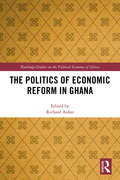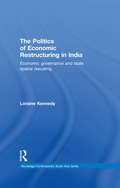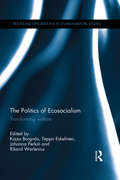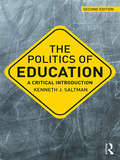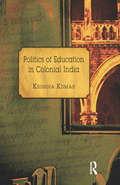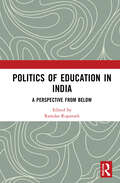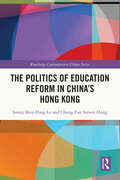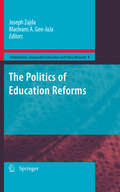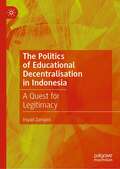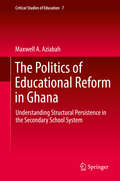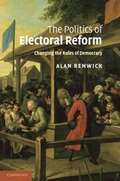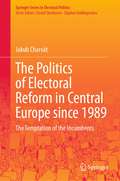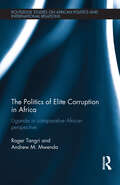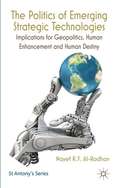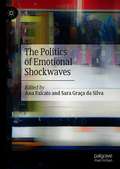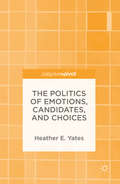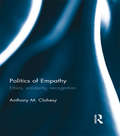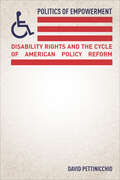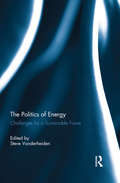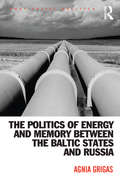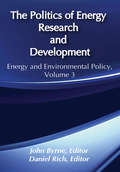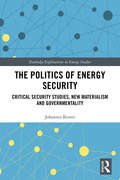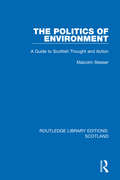- Table View
- List View
The Politics of Economic Reform in Ghana (Routledge Studies on the Political Economy of Africa)
by Richard AidooThis book explores the significant economic transformation of Ghana over the three decades since the end of the Cold War, focusing on the role of political-economic change and reform. The Politics of Economic Reform in Ghana presents a range of perspectives from scholars drawn from both academia and policy-making on the way Ghanaian economic reforms have been shaped by various political and economic actors. First, it establishes and debates the uniqueness of Ghana as a case study in Africa, and the developing world. Second, the book offers a broad account of how global and domestic political or institutional actors have contributed to shaping economic development in Ghana. Drawing on theoretical perspectives, the volume assesses how major political-economic changes have affected Ghana’s economic development. This book will be of interest to students, scholars, policymakers, and organizations interested in the economic and political advancement of Africa, as well as African Politics and Economics.
The Politics of Economic Restructuring in India: Economic Governance and State Spatial Rescaling (Routledge Contemporary South Asia Series)
by Loraine KennedyState re-scaling is the central concept mobilized in this book to interpret the political processes that are producing new economic spaces in India. In the quarter century since economic reforms were introduced, the Indian economy has experienced strong growth accompanied by extensive sectoral and spatial restructuring. This book argues that in this reformed institutional context, where both state spaces and economic geographies are being rescaled, subnational states play an increasingly critical role in coordinating socioeconomic activities. The core thesis that the book defends is that the reform process has profoundly reconfigured the Indian state’s rapport with its territory at all spatial scales, and these processes of state spatial rescaling are crucial for comprehending emerging patterns of economic governance and growth. It demonstrates that the outcomes of India’s new policy regime are not only the product of impersonal market forces, but that they are also the result of endogenous political strategies, acting in conjunction with the territorial reorganisation of economic activities at various scales, ranging from local to global. Extensive empirical case material, primarily from field-based research, is used to support these theoretical assertions. Scholars of political economy, political and economic geography, industrial development, development studies and Asian Studies will find this a stimulating and innovative contribution to the study of the political economy in the developing countries.
The Politics of Ecosocialism: Transforming welfare (Routledge Explorations in Environmental Studies)
by Kajsa Borgnäs Teppo Eskelinen Johanna Perkiö Rikard WarleniusAs the global economy seeks to recover from the financial crisis and warnings about the consequences of climate change abound, it is clear that we need a fundamentally new approach to tackle these issues. This innovative book offers a unique perspective, stressing the necessity of both ecological and social change as it discusses how to create a "red-green" or "eco-socialist" society. Examining the current crises of welfare capitalism as well as the challenges and conflicts of an eco-socialist society, the book proposes a new social order that would combine the ideals of egalitarianism and of environmental sustainability. It analyses the key social and ecological issues related to the welfare state, including green Keynesianism, ecological Marxism, the limits of growth and no-growth, capitalist barriers to a renewable energy transition, proposals for a universal basic income and the role of technology. Finally, the book outlines possible paths of transformation towards creating an eco-socialist society, drawing out lessons that can be applied internationally. This book will be of great interest to students and researchers in economics, environmental studies and political science.
The Politics of Education: A Critical Introduction (Critical Introductions in Education)
by Kenneth J. SaltmanThe Politics of Education provides an introduction to both the political dimensions of schooling and the politics of recent educational reform debates. The book offers undergraduates and starting graduate students in education an understanding of numerous dimensions of the contested field of education, addressing questions of political economy, class, cultural politics, race, and gender. Noted scholar Kenneth Saltman introduces contemporary educational debates and seriously considers views across the political spectrum from the vantage point of critical education, emphasizing schooling for broader social equality and justice. Updates to this second edition work through contemporary reform debates that include topics such as the reauthorization of ESEA, race and diversity, standardized testing and common core, and classroom technology. With opportunities for readers to engage in deeper discussion through Questions for Further Discussion and a Glossary of key terms, The Politics of Education remains a much-needed, accessible primer, providing the critical tools needed to make sense of the current politics of education.
Politics of Education in Colonial India (3D Photorealistic Rendering)
by Krishna KumarIn retracting from the popular view that India’s modern educational policy was shaped almost entirely by Macaulay, this incisive work reveals the complex ideological and institutional rubric of the colonial educational system. It examines its wide-ranging and lasting impact on curriculum, pedagogy, textbooks, teachers’ role and status, and indigenous forms of knowledge. Recounting the nationalist response to educational reforms, the book reinforces three major quests: justice as expressed in the demand for equal educational opportunities for the lower castes; self-identity as manifest in the urge to define India’s educational needs from within its own cultural repertoire; and the idea of progress based on industrialization. An exceptional contribution to educational theory, including a nuanced discussion of caste, gender and girls’ education, this book will be invaluable to teachers, scholars and students of education, modern Indian history and sociology of education, and policy makers.
Politics of Education in India: A Perspective from Below
by Ramdas RupavathThis book studies the state of tribal education in India. India has the single largest tribal population in the world, yet the tribal community remains one of the most economically impoverished and marginalized groups in the country. The volume • Examines the educational status of the tribal population and studies developmental issues such as unemployment, illiteracy, caste discrimination, and inequality faced by the community. • Studies the implementation and execution of welfare schemes, initiatives, and reforms in place to tackle issues faced by tribal students and identifies loopholes in the various centrally sponsored schemes. • Emphasizes the importance of the Right to Education Act and presents policy implications for the educational uplift of India’s very many millions of tribal people. A critical study of the Indian education system, this book will be indispensable to students and researchers of education, education policy, minority studies, indigenous studies, sociology of education, and South Asian studies.
The Politics of Education Reform in China’s Hong Kong (Routledge Contemporary China Series)
by Sonny Shiu-Hing Lo Chung Fun HungEducation reform has become a highly political issue in the Hong Kong Special Administrative Region (HKSAR) since the transfer of sovereignty to the People’s Republic of China (PRC). Lo and Hung focus on the political struggles among stakeholders, including the government of Hong Kong, the Catholic Church, parents, students, teachers, the central authorities of Beijing, and even the bureaucratic politics between Beijing, the Hong Kong government and the Examination Authority. They examine the key elements of education reform in the HKSAR, including language and curriculum reform, national security education, civic and patriotic education, the rise of the pro-Beijing education elites and interest groups, and the revamp of examination questions and examination authority. The entire education reform in the HKSAR has pushed the Hong Kong education system toward a process of mainlandization, making Hong Kong’s education system more similar to the mainland system with emphasis on political "correctness" in the understanding of Chinese national security, history and culture. Highlighting the political struggles among the various stakeholders, this book is essential for scholars of Hong Kong and China, especially those with an interest in the relationship between education and politics.
The Politics of Education Reforms
by Macleans A. Geo-JaJa Joseph ZajdaThis, the ninth in the 12-volume series Globalization, Comparative Education and Policy Research, focuses on the politics at play in the arena of education reform. As with the other publications in the group, this one features scholarly research into major areas of inquiry related to education and globalisation. Here, the research is focused on key debates in the politics of education reforms. Again, this volume offers researchers, practitioners and policymakers a state-of-the-art sourcebook of the very latest thinking on the subject. Case studies are culled from places as diverse as Russia, where education reforms have attempted the wholesale remodeling of the former Soviet-style system characterised by top-down uniformism, to the Niger Delta, where it is argued that only non market-based approaches can combat the endemic social exclusion, poverty and social inequity. Japan's evolving universities, Israel's self-managing schools, and English teaching in Chinese colleges also feature. In addition to the site-specific research, contributors offer a number of in-depth analyses exploring issues at the interface of education theory and political philosophy. These include an examination of the dominant paradigms employed in critiquing education reforms and a discussion of the nexus between neoliberalism and policy change in higher education, in which it is argued that the continued existence and political importance of nation states makes their universities far from neutral sites of knowledge and knowledge construction. Globalisation and competitive market forces have generated an upsurge in the knowledge industries that is having profound differential effects on educational institutions, an analysis acknowledged by this text. As educational organisations are compelled to embrace the corporate ethos of efficiency, accountability and profit-driven managerialism, the potential is created for further polarisation and socio-economic divisions in society that may result in discontent and social conflict.
The Politics of Educational Decentralisation in Indonesia: A Quest for Legitimacy
by Irsyad Zamjani“The Politics of Educational Decentralisation in Indonesia: A Quest for Legitimacy is a well written, analytically sharp, and compelling study of educational decentralisation in Indonesia. Irsyad Zamjani, provides fresh insights into this important topic. The author treats educational reform as a window into much deeper questions about power, the government’s responsibility to its citizens, and social change in Indonesia. His findings should interest academics as well as practitioners with an interest in educational reform.” —Professor Christopher Bjork, Vassar College, New York “This is a remarkable book which should appeal not only to Indonesian scholars, but also to educationists and political scientists, to name just a few. By tracing the path of decentralisation in the Indonesian educational reform in the early 2000s, Zamjani shows how the central and municipal governments struggled in different ways to retain control over education in their domains through various mechanisms largely related to claims of legitimacy. The study is grounded in new institutional theory, and the interview and case study data provide a richness and depth in showing the dynamics of reform attempts.” —Professor Lawrence J. Saha, Australian National University, Canberra This book discusses the dynamics of educational decentralisation in post-reform Indonesia. Taking sociology’s new institutionalism approach, and drawing upon data from documents and interviews with strategic informants, the book investigates how institutional legitimacy of educational decentralisation was garnered, manipulated, and then contested. Besides analysing global institutional pressures which influenced the national adoption of decentralisation reform, and the central government’s attempts to restore its legitimacy, the book also offers comparative case studies of education governance in two local districts to highlight how this reform is responded to at the local level.
The Politics of Educational Reform in Ghana: Understanding Structural Persistence in the Secondary School System (Critical Studies of Education #7)
by Maxwell A. AziabahThis book comprises six main chapters and addresses the core research question: How can the endurance of academic bias in Ghana’s secondary education system be explained in the context of educational reform versus change of government concurrence? Six sub-questions have subsequently been derived from the core research question, enabling a comprehensive and rigorous treatment of the subject matter of investigation. The manuscript adopts an historical institutionalism approach, combining path dependency with partisan theory in explicating structural persistence in the secondary school system in Ghana. A case study methodological design procedure has been employed in the investigation of three episodes of educational reform, anchored on qualitative content analysis as the main data reduction mechanism.
The Politics of Electoral Reform
by Alan RenwickElections lie at the heart of democracy, and this book seeks to understand how the rules governing those elections are chosen. Drawing on both broad comparisons and detailed case studies, it focuses upon the electoral rules that govern what sorts of preferences voters can express and how votes translate into seats in a legislature. Through detailed examination of electoral reform politics in four countries (France, Italy, Japan and New Zealand), Alan Renwick shows how major electoral system changes in established democracies occur through two contrasting types of reform process. Renwick rejects the simple view that electoral systems always straightforwardly reflect the interests of the politicians in power. Politicians' interests are complex; politicians are sometimes unable to pursue reforms they want; occasionally, they are forced to accept reforms they oppose. The Politics of Electoral Reform shows how voters and reform activists can have real power over electoral reform.
The Politics of Electoral Reform in Central Europe since 1989: The Temptation of the Incumbents (Springer Series in Electoral Politics)
by Jakub CharvátThis book on the politics of electoral reform in Central Europe since 1989 explains by whom, why, and how the electoral rules were changed in Central Europe in the post-Communist period. Examining the contextual factors affecting, underlying, and/or initiating these changes, the book identifies main actors, their motivations, and other circumstances surrounding the electoral reform processes. It further explores their political consequences, particularly on proportionality and personalization.Based on a detailed analysis of electoral reform processes in Czechoslovakia, Czechia, Hungary, and Slovakia over the past thirty years, the book discusses how the politics of electoral reform in Central Europe is mostly driven, controlled, and decided by politicians, with other actors being either overlooked or ignored. Finally, it argues that most of the cases were imposed by an elite majority, with the sole exception of the Czech Republic, where the politics of electoral reform were influenced by the intervention of the constitutional court as an external actor.The book will appeal to students, researchers, and scholars of political science interested in a better understanding of electoral politics in general, as well as democratic transformation processes and electoral reform in Central Europe.
The Politics of Elite Corruption in Africa: Uganda in Comparative African Perspective (Routledge Studies in African Politics and International Relations)
by Roger Tangri Andrew M MwendaThis book considers the causes of high-level state corruption as well as the political constraints of countering corruption in Africa. It examines elite corruption in government as well as in the political and military spheres of state activity, and focuses on illegal behaviour on the part of state and non-state actors in decision-making. Situating corruption and anti-corruption within a political framework, this book analyses the motivations, opportunities and relative autonomy of state elites to manipulate state decision-making for personal and political ends. Based on detailed case studies in Uganda, the authors focus on corruption in the privatization process, military procurement, foreign business bribery, illegal political funding, and electoral malpractice. The book examines why anti-corruption institutions and international donors have been constrained in confronting this executive abuse of power, and discusses the wider relevance of Uganda’s experience for understanding elite corruption and anti-corruption efforts in other African countries. The Politics of Elite Corruption in Africa will be of interest to students and scholars of African politics, African political economy, development studies, corruption and government.
The Politics of Eloquence
by Marc HanveltHistory has shown us that the power of political speech can be put to both positive and manipulative ends - while rhetoric is a powerful tool for those who seek to persuade others to adopt their views, it can also be employed to foment factionalism and undermine the very basis of a democratic society. In this unique study, Marc Hanvelt shows how eighteenth-century philosopher David Hume confronted questions about the negative moral and political effects of rhetoric, and how he differentiated between manipulative and non-manipulative political speech.Drawing on Hume's philosophical, historical, and popular writings, The Politics of Eloquence presents an understanding of rhetoric that can be properly ascribed to this important thinker, an understanding hitherto overlooked in the scholarly literature. Offering an original approach to thinking about political rhetoric - an essential element of democratic politics - Hanvelt makes important contributions to both Hume scholarship and to broader areas in political theory and philosophy.
The Politics of Emerging Strategic Technologies
by Nayef R.F. Al-RodhanEmerging technologies hold great promise but also pose major challenges to global politics, national and international security, human dignity and human destiny. This book examines the latest innovations, key trends and geopolitical and human implications of emerging strategic technologies such as Biotechnology, Nanotechnology and Artificial Intelligence. The potential use and misuse of these technologies in human enhancement (physical and cognitive) is considered to be one of the major challenges of our time. Nayef Al-Rodhan argues that human enhancement and the future evolution into transhumans is inevitable. To prepare for these potential existential threats, the global community is urged to establish strict moral and legal guidelines that balance the need for innovation with the guarantee of dignity for all
The Politics of Emotional Shockwaves
by Ana Falcato Sara Graça da SilvaThis interdisciplinary volume brings together specialists from different backgrounds to deliver expert views on the relationship between morality and emotion, putting a special emphasis on issues related to emotional shocks. One of the distinctive aspects of social existence today is our subjection to traumatic events on a global scale, and our subsequent embodiment of the emotional responses these events provoke. Covering various methodological angles, the contributors ensure careful and heterogeneous reflection on this delicate topic. With eleven original essays, the collection spans a wide variety of fields from philosophy and literary theory, to the visual arts, history, and psychology. The authors cover diverse themes, including philosophical approaches to political polarization; the impact of negative emotions such as anger on inter-relational balance; humour and politics; media and the idea of progress; photography and trauma discourse; democratic morality in modern Indian society; emotional olfactory experiences; phenomenological readings of spatial disorientation, and the significance of moral shocks. This timely volume offers crucial perspectives on contemporary questions relating to ethical behaviours, and the challenges of a globalized society on the verge of political, financial and emotional collapse.
The Politics of Emotions, Candidates, and Choices
by Heather E. YatesAnchored in the idea that political campaigns matter to electoral outcomes, The Politics of Emotions, Candidates and Choices analyzes the dynamics of emotional voting and decision-making over the course of three presidential elections between 2004 and 2012. Each presidential campaign reflects a unique tone and mood, which influences voters' perceptions of choices and candidate image. Accounting for the idiosyncratic nature of a campaign environment and a candidate's message, this analysis isolates specific emotional dimensions that were influential on voters' appraisals of specific campaign issues. Relying on the Affective Intelligence theory and the Transfer-of-Affect thesis to narrate the causal relationships between voters' emotional responses and issue appraisals, this book illustrates the specific electoral contexts when voters' emotions are trusted as political knowledge and transferred to their beliefs about certain policies.
Politics of Empathy: Ethics, Solidarity, Recognition
by Anthony M. ClohesyThe Politics of Empathy argues that empathy is a necessary condition for ethical subjectivity and the emergence of a more compassionate world. One of the reasons empathy is important is because it gives us a sense of what it is like to be someone else. However, to understand its ethical significance we need to look elsewhere. This book claims that empathy is ethically significant because, uniquely, it allows us to reflect critically on the nature of our own lives and sense of identity. More specifically, it allows us to reflect critically on the contingency, finitude and violence that define existence. It is argued that, without this critical reflection, a more ethical and democratic world cannot come into being. Our challenge today therefore is to establish the social and political conditions in which empathy can flourish. This will be a difficult task because powerful political and cultural forces are reinforcing the divisions between us rather than encouraging us to come together in a cosmopolitan community of mutual recognition and solidarity. However, despite these limits, there is hope for a brighter future. The book argues that this can only come about if the Left accepts its responsibility to articulate the contours of a new politics of internationalism and establish the foundations of a sustainable ethical community in which strangers will be accepted unconditionally. This work will be of interest to students and scholars of political theory, multiculturalism and international relations.
Politics of Empowerment: Disability Rights and the Cycle of American Policy Reform
by David PettinicchioDespite the progress of decades-old disability rights policy, including the landmark Americans with Disabilities Act, threats continue to undermine the wellbeing of this population. The U.S. is, thus, a policy innovator and laggard in this regard. In Politics of Empowerment, David Pettinicchio offers a historically grounded analysis of the singular case of U.S. disability policy, countering long-held views of progress that privilege public demand as its primary driver. By the 1970s, a group of legislators and bureaucrats came to act as "political entrepreneurs." Motivated by personal and professional commitments, they were seen as experts leading a movement within the government. But as they increasingly faced obstacles to their legislative intentions, nascent disability advocacy and protest groups took the cause to the American people forming the basis of the contemporary disability rights movement. Drawing on extensive archival material, Pettinicchio redefines the relationship between grassroots advocacy and institutional politics, revealing a cycle of progress and backlash embedded in the American political system.
The Politics of Energy: Challenges for a Sustainable Future
by Steve VanderheidenThis book brings together leading scholars on the politics of energy, examining the natural resources and developing technologies that are essential to its production and the various public and private factors affecting its use, along with the ecological consequences of both. Section One examines the looming challenges posed by continuing dependence upon oil as a primary energy source, including "peak oil" scenarios and the social and political consequences of resource extraction upon the developing world. Section Two considers proposals to dramatically increase nuclear power production as a means to reduce carbon emissions, with both the risks and potential of this "nuclear option" carefully weighed. Although many tout renewable energy sources for their environmental benefits, Section Three calls attention to several potential problems with large-scale renewable energy development and the dilemmas that they have caused for would-be supporters of such efforts. Finally, Section Four weighs the prospects for developing sustainable energy systems on the ground, including conservation measures that reduce energy demand and system-wide energy policy efforts. Together, these essays demonstrate the importance of sound energy policy along with the numerous obstacles to developing and implementing it. This book was originally published as a special issue of Environmental Politics.
The Politics of Energy and Memory between the Baltic States and Russia (Post-Soviet Politics)
by Agnia GrigasSince the 1990s, Baltic-Russian relations have been amongst the most contentious on the European continent. Energy security concerns, historical legacies, and the status of Russian minorities have all proved key flash points. Baltic-Russian relations have been described as a 'litmus test' of Russia's willingness to leave behind its imperialist ambitions; simultaneously the policies of Tallinn, Riga or Vilnius towards Russia can have a direct impact on EU-Russian and NATO-Russian relations. The Baltic states share similar histories and resources, and face the same geopolitical challenges. All are dependent on Russia for energy yet, as this fascinating study reveals, they have pursued very different foreign policies towards their powerful neighbour. In The Politics of Energy and Memory between the Baltic States and Russia Agnia Grigas provides an unprecedented analysis of contemporary Baltic-Russian relations and identifies the causal factors that drive the foreign policies of the Baltic states in such divergent routes. Supported by case studies on the oil and gas sectors as well as the tug of history, this book is an invaluable resource for scholars and policy makers.
Politics of Energy Dependency
by Margarita M. BalmacedaEnergy has been an important element in Moscow's quest to exert power and influence in its surrounding areas both before and after the collapse of the USSR. With their political independence in 1991, Ukraine, Belarus, and Lithuania also became, virtually overnight, separate energy-poor entities heavily dependent on Russia. This increasingly costly dependency - and elites' scrambling over associated profits - came to crucially affect not only relations with Russia, but the very nature of post-independence state building.The Politics of Energy Dependency explores why these states were unable to move towards energy diversification. Through extensive field research using previously untapped local-language sources, Margarita M. Balmaceda reveals a complex picture of local elites dealing with the complications of energy dependency and, in the process, affecting the energy security of Europe as a whole.A must-read for anyone interested in Eastern Europe, Russia, and the politics of natural resources, this book reveals the insights gained by looking at post-Soviet development and international relations issues not only from a Moscow-centered perspective, but from that of individual actors in other states.
The Politics of Energy Research and Development
by John Byrne and Daniel RichThe Politics of Energy Research and Development examines and evaluates U.S. research and development policies to promote nuclear, solar, conservation, and other technology options. This volume is the third in the series Energy Policy Studies, which explores fundamental, long-term social, political, and economic dimensions of energy technology, resources, and use. Contributions represent a wide range of theoretical and policy perspectives, including sociology, economics, political science, urban and regional studies, environmental analysis, and history and philosophy of technology.Contents: Richard L. Ottinger, ""Introduction: The Tragedy of U.S. Energy R&D Policy""; Amor^ B. Lovins, ""The Origins of the Nuclear Power Fiasco""; Richard T. Sylves, ""Nuclear Exotica: Peaceful Use of Nuclear Explosives""; Eugene Frankel, ""Technology, Politics and Ideology: The Vicissitudes of Federal Solar Energy Policy, 1974-1983""; Maxine Savitz, ""The Federal Role in Conservation Research and Development""; J. David Roessner, ""Commercialization Issues in Energy Technology Policy""; John Byrne and Daniel Rich, ""In Search of the Abundant Energy Machine""; and Grant P. Thompson, ""Energy Policy in the Interim: Waiting for the Next Shoe to Drop.
The Politics of Energy Security: Critical Security Studies, New Materialism and Governmentality (Routledge Explorations in Energy Studies)
by Johannes KesterEnergy security is known for its ‘slippery’ nature and subsequent broad range of definitions. Instead of another attempt to grasp its essence, this book offers a critical reflection that problematizes the use of energy security itself. After a short historical and methodological analysis of the proliferation of energy security, The Politics of Energy Security unpacks three social practices that drive energy security. These include an analysis of the logics of security, a study of the relation between the materiality of sociotechnical (energy) systems and the knowledge people have over such systems, and a reflection on the power and politics behind (energy) security. Each of these are discussed and ultimately illustrated in the last chapter to show how energy security works, how it is shaped and what role it plays within political processes. Based on a novel performative reading of energy security with its focus on ontological politics and an in-depth look at the often implicitly accepted social practices that determine how people shape and are shaped by energy security, this book will be of great interest to students and scholars of energy security and policy, political theory, international relations, critical security studies, and environmental studies more broadly.
The Politics of Environment: A Guide to Scottish Thought and Action (Routledge Library Editions: Scotland #28)
by Malcolm SlesserOriginally published in 1972 and ahead of its time in many respects this book was the first to take a constructive approach to the problems facing the human race in the 20th Century. It remains enduringly relevant today and discusses over-population, under-employment, atmospheric pollution, exhaustion of global resources and geo-politics. It shows how all these issues are inter-connected and therefore how conventional attempts to solve some of them merely exacerbate others. It asserts that the solution rests in the evolution of a realistic form of politics which puts the community first.
